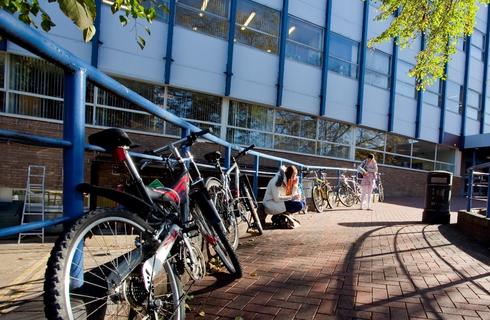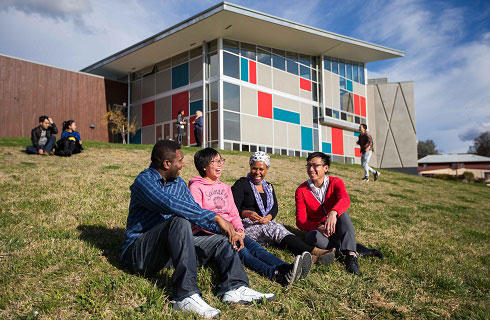理学研究生文凭-环境科学
Graduate Diploma in Science - Environmental Science

学历文凭
Postgraduate Diploma

专业院系
Faculty of Science

开学时间

课程时长

课程学费

国际学生入学条件
You must have completed an undergraduate degree in science at a recognised university (or similar institution) and passed first-year courses in your intended specialisation.
A GPA/GPE of at least 3.0 is strongly recommended
You can still gain entry if you have gained the equivalent level of competence through work experience or a professional qualification.
IELTS (Academic): Overall score of 6.0 and no bands below 5.5; Internet based TOEFL (iBT): Overall score of 80 and a written score of 21; Paper-based TOEFL: Overall score of 60 and a writing score of 21; Cambridge English: Advanced (CAE), Cambridge English Proficiency (CPE): Overall score of 169 and no bands below 162; Foundation Certificate in English for Academic Purposes (FCertEAP): Grade of C-; Pearson Test of English (PTE) Academic: Overall score of 50 and no PTE Communicative score below 42; Michigan English Language Assessment Battery (MELAB): 80.
IDP—雅思考试联合主办方

雅思考试总分
6.0
- 雅思总分:6
- 托福网考总分:80
- 托福笔试总分:160
- 其他语言考试:Pearson Test of English (PTE) - Overall score of 50 and no PTE Communicative score below 42
CRICOS代码: AU0265
申请截止日期: 请与IDP联系 以获取详细信息。
课程简介
The Graduate Diploma in Science will extend the knowledge and expertise gained from your Bachelor of Science degree. The GradDipSci provides you with an opportunity to choose a second major, extend the field of study you chose for your Bachelor of Science degree, or continue to learn from another discipline at undergraduate level within the Faculty of Science. The GradDipSci also provides a pathway to enter into further study at postgraduate level. Because science plays a vital role in addressing the key issues that confront us and future generations, studying the Sciences opens up a wide range of career opportunities. If you have been away from study for a while, the GradDipSci provides an opportunity to learn about new developments in your field of expertise.Environmental Science seeks to use a range of approaches to better understand and solve environmental problems. From studying the environmental effects of human activity to applying scientific knowledge and skills to preserve and restore our natural heritage – Environmental Science seeks solutions to pressing environmental problems. You will focus on real-world problems, the biological, chemical and physical processes that underlie them, and ways in which humans interact in these issues. You will gain skills in understanding and processing scientific information. You will analyse and model environmental data, and communicate that information, including the risk and uncertainty involved in it, to better preserve and restore our natural environment.
相关申请
 预科
预科 奖学金
奖学金 实习机会
实习机会 在校学习
在校学习 跨境学习
跨境学习 校园授课-线上开始
校园授课-线上开始 在线/远程学习
在线/远程学习
开学时间&学费
学费信息仅供参考,请与IDP联系以获取详细信息
| 开学时间 | 时长 | 学费 | 地点 |
|---|
学校排名

世界排名201
数据源:
泰晤士高等教育世界大学排名
关于奥克兰大学

奥克兰大学(Waipapa Taumata Rau)位于世界上文化最多元化的城市之一,是新西兰唯一一所跻身世界百强的大学(2025 年 QS 世界大学排名)。该大学拥有七个校区,在校学生超过 40000 人,享有世界领先教育机构的美誉。学校每年接待来自 100 多个国家的 8000 多名留学生。该大学在帮助学生取得成功方面取得了卓越的成绩,其毕业生成果在新西兰排名第一(2025 年 QS 世界排名)就是最好的证明。2024 年,该校在《泰晤士报》全球高等教育影响力排名中保持第一(第 13 位),这是对该校在实现可持续发展目标方面所取得进展的认可。在 2024 年 QS 世界大学学科排名中,该校有 10 个学科进入前 50 名,为学生提供了无可争议的高质量学习体验。这些学科包括人类学、英语语言文学、教育学、土木工程和心理学。该大学拥有60多个研究中心和研究所,以为学生提供高水平教育为荣,使学生有能力为全球、社会、经济和文化的未来作出贡献和创造。学生还可以通过加入近200个不同的俱乐部和社团,使自己沉浸在大学社区中。
本校相关课程

语言教学深造文凭
学历文凭
Postgraduate Diploma
开学日期
课程费用总额


健康科学研究生文凭-健康科学
学历文凭
Postgraduate Diploma
开学日期
课程费用总额


美术学士(荣誉学位)
学历文凭
Bachelor Degree with Honours
开学日期
课程费用总额


财产学士
学历文凭
Bachelor Degree
开学日期
课程费用总额


护理学学士
学历文凭
Bachelor Degree
开学日期
课程费用总额


法学学士(荣誉学位)
学历文凭
Bachelor Degree with Honours
开学日期
课程费用总额










 新西兰
新西兰